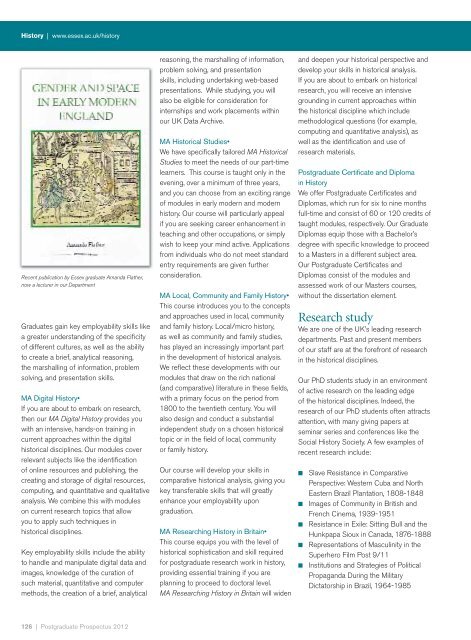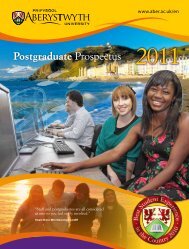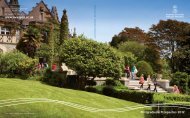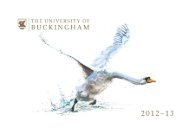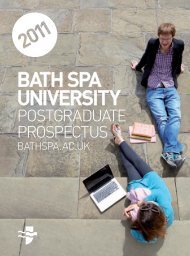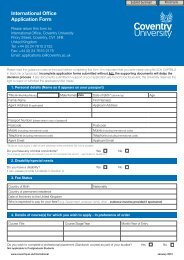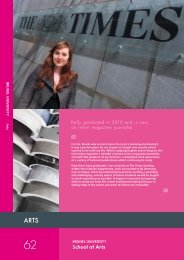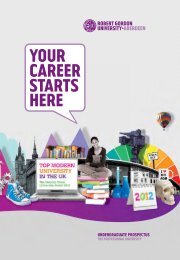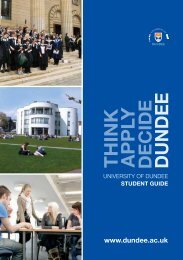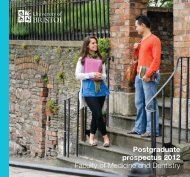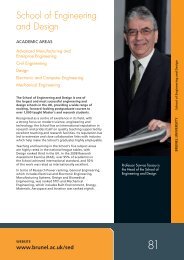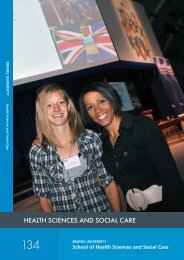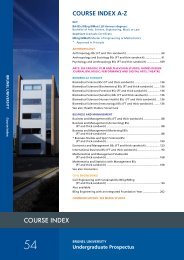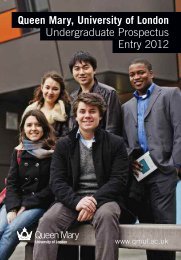Postgraduate Prospectus
Postgraduate Prospectus
Postgraduate Prospectus
Create successful ePaper yourself
Turn your PDF publications into a flip-book with our unique Google optimized e-Paper software.
History | www.essex.ac.uk/history<br />
Recent publication by Essex graduate Amanda Flather,<br />
now a lecturer in our Department<br />
Graduates gain key employability skills like<br />
a greater understanding of the specificity<br />
of different cultures, as well as the ability<br />
to create a brief, analytical reasoning,<br />
the marshalling of information, problem<br />
solving, and presentation skills.<br />
MA Digital History•<br />
If you are about to embark on research,<br />
then our MA Digital History provides you<br />
with an intensive, hands-on training in<br />
current approaches within the digital<br />
historical disciplines. Our modules cover<br />
relevant subjects like the identification<br />
of online resources and publishing, the<br />
creating and storage of digital resources,<br />
computing, and quantitative and qualitative<br />
analysis. We combine this with modules<br />
on current research topics that allow<br />
you to apply such techniques in<br />
historical disciplines.<br />
Key employability skills include the ability<br />
to handle and manipulate digital data and<br />
images, knowledge of the curation of<br />
such material, quantitative and computer<br />
methods, the creation of a brief, analytical<br />
reasoning, the marshalling of information,<br />
problem solving, and presentation<br />
skills, including undertaking web-based<br />
presentations. While studying, you will<br />
also be eligible for consideration for<br />
internships and work placements within<br />
our UK Data Archive.<br />
MA Historical Studies•<br />
We have specifically tailored MA Historical<br />
Studies to meet the needs of our part-time<br />
learners. This course is taught only in the<br />
evening, over a minimum of three years,<br />
and you can choose from an exciting range<br />
of modules in early modern and modern<br />
history. Our course will particularly appeal<br />
if you are seeking career enhancement in<br />
teaching and other occupations, or simply<br />
wish to keep your mind active. Applications<br />
from individuals who do not meet standard<br />
entry requirements are given further<br />
consideration.<br />
MA Local, Community and Family History•<br />
This course introduces you to the concepts<br />
and approaches used in local, community<br />
and family history. Local/micro history,<br />
as well as community and family studies,<br />
has played an increasingly important part<br />
in the development of historical analysis.<br />
We reflect these developments with our<br />
modules that draw on the rich national<br />
(and comparative) literature in these fields,<br />
with a primary focus on the period from<br />
1800 to the twentieth century. You will<br />
also design and conduct a substantial<br />
independent study on a chosen historical<br />
topic or in the field of local, community<br />
or family history.<br />
Our course will develop your skills in<br />
comparative historical analysis, giving you<br />
key transferable skills that will greatly<br />
enhance your employability upon<br />
graduation.<br />
MA Researching History in Britain•<br />
This course equips you with the level of<br />
historical sophistication and skill required<br />
for postgraduate research work in history,<br />
providing essential training if you are<br />
planning to proceed to doctoral level.<br />
MA Researching History in Britain will widen<br />
and deepen your historical perspective and<br />
develop your skills in historical analysis.<br />
If you are about to embark on historical<br />
research, you will receive an intensive<br />
grounding in current approaches within<br />
the historical discipline which include<br />
methodological questions (for example,<br />
computing and quantitative analysis), as<br />
well as the identification and use of<br />
research materials.<br />
<strong>Postgraduate</strong> Certificate and Diploma<br />
in History<br />
We offer <strong>Postgraduate</strong> Certificates and<br />
Diplomas, which run for six to nine months<br />
full-time and consist of 60 or 120 credits of<br />
taught modules, respectively. Our Graduate<br />
Diplomas equip those with a Bachelor’s<br />
degree with specific knowledge to proceed<br />
to a Masters in a different subject area.<br />
Our <strong>Postgraduate</strong> Certificates and<br />
Diplomas consist of the modules and<br />
assessed work of our Masters courses,<br />
without the dissertation element.<br />
Research study<br />
We are one of the UK’s leading research<br />
departments. Past and present members<br />
of our staff are at the forefront of research<br />
in the historical disciplines.<br />
Our PhD students study in an environment<br />
of active research on the leading edge<br />
of the historical disciplines. Indeed, the<br />
research of our PhD students often attracts<br />
attention, with many giving papers at<br />
seminar series and conferences like the<br />
Social History Society. A few examples of<br />
recent research include:<br />
n Slave Resistance in Comparative<br />
Perspective: Western Cuba and North<br />
Eastern Brazil Plantation, 1808-1848<br />
n Images of Community in British and<br />
French Cinema, 1939-1951<br />
n Resistance in Exile: Sitting Bull and the<br />
Hunkpapa Sioux in Canada, 1876-1888<br />
n Representations of Masculinity in the<br />
Superhero Film Post 9/11<br />
n Institutions and Strategies of Political<br />
Propaganda During the Military<br />
Dictatorship in Brazil, 1964-1985<br />
126 | <strong>Postgraduate</strong> <strong>Prospectus</strong> 2012


